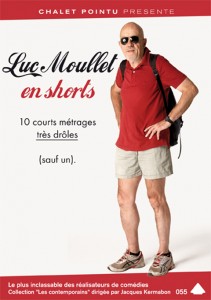From Cinema Scope No. 45, Winter 2011. -– J.R.


As a postscript to and short commentary on the closing section of Ted Fendt’s interview with Luc Moullet in the previous issue of Cinema Scope, l’d like to propose that (a) Moullet’s two most recent shorts, Toujours moins and Chef-d’oeuvre?, provide a kind of summary of Moullet’s work as a whole, by focusing respectively on economy and art, and (b) the second of these actually fuses these two concerns, offering not only a digest of his oeuvre as both a filmmaker and a critic, but also a short manifesto that exalts the importance of shortness itself in relation to his particular talents.

Moullet’s best work as a filmmaker can generally be found in his shorts — which makes it all the more regrettable that the Moullet box set with English subtitles includes only his features, and the sole collection of his shorts on DVD (Luc Moullet en shorts, 2009) is untranslated. The most important exceptions to this rule are Genèse d’un repas (1978), arguably his most profound statement about economy, and Anatomie d’un rapport (1976), but it might be added that many of his other best features, such as Les contrabandières (1968), La comédie du travail (1987), and Parpaillon (1993), are effectively collections of thematically related shorts, while some of his thinnest – – e.g., Read more
From the Chicago Reader (October 5, 1990). From the vantage point of 2013, The Wolf of Wall Street might be regarded in certain respects as an inferior remake of GoodFellas, with all the limitations of the original dutifully preserved. — J.R.
GOODFELLAS
*** (A must-see)
Directed by Martin Scorsese
Written by Nicholas Pileggi and Scorsese
With Ray Liotta, Joe Pesci, Lorraine Bracco, Robert De Niro, Paul Sorvino, Chuck Low, Frank Sivero, and Debi Mazar.
Greed, indiscipline and amorality drench the money-military culture, in its upper echelons and in its pits. Somebody destroyed the national superego. Does anyone have a plan to make one anew? — from a recent editorial in the Nation

The opening, white-against-black credits of Martin Scorsese’s GoodFellas whiz horizontally across the screen to the sounds of traffic in quick, isolated bursts, telling us at the outset that speed is of the essence. Using a cast of almost 150 players (including a delightful performance by Scorsese’s mother Catherine) and a sound track with about 40 pop singles that are both apposite and subtle in the way they comment on the action, Scorsese pushes the narrative along with a sense of gliding motion and legible fluidity that is often breathtaking. Read more
From the Jewish Daily Forward, January 31, 2013. — J.R.

I’ve seen only two features written and directed by Michael Roemer — Nothing But a Man (1964) and The Plot Against Harry (made between 1966 and 1968, but released only in 1989). Either of these suffice to make him a major American filmmaker. And two other Roemer scripts I’ve read — one of which he managed to film (Pilgrim, Farewell, 1982), the other of which he hasn’t (Stone My Heart — undated, but apparently from the late 60s and/or early 70s) — show equivalent amounts of conviction, originality, density, and courage. But there’s a fair chance that you’ve never heard of him. And I think one of the reasons why could be that he’s a man who knows too much.
What do I mean by this? Partly that these films are politically incorrect (meaning that they all grapple with life while posing diverse challenges to people who think mainly in established and unexamined political and ethnic categories) and partly that in filmmaking we often confuse advertising and hustling with other kinds of talent — most obviously when it comes to the Oscars, but also when it comes to how we categorize and package various achievements. Read more





